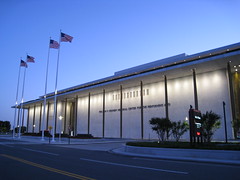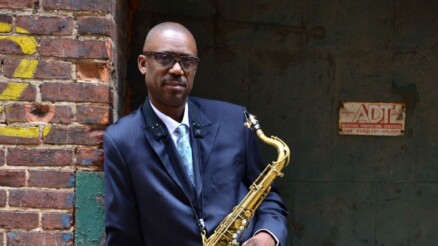News | Jason Moran’s appointment as the Kennedy Center’s jazz advisor marks a new era


by Giovanni Russonello
Editorial board
When the Kennedy Center named pianist Jason Moran as its artistic advisor for jazz last week, the institution was making a much-needed nod to the spirit of immediacy and innovation that has shot through the jazz world in recent years.
As recently as March, the Washington Post took the Kennedy Center to task for its conservative jazz programming, which can often seem out of touch with the music’s contemporary advances. With the 36-year-old Moran on board, such complaints will be much less likely.
“Jazz continues to evolve – and Jason is a leader in that regard,” Kennedy Center Director of Jazz Programming Kevin Struthers said via email. “Jason has a great respect for the traditions and masters … while continuing to place his own stamp on the music in a contemporary context.”
Indeed, Moran’s eyes and ambitions are trained straight ahead: He is prone to covering hip-hop tunes or incorporating sound art into his trio’s improvisations. At the same time, he is among the diminishing number of active musicians to have benefited directly from the mentorship of past giants. Just like the work of his teachers — pioneering pianists Jaki Byard and Andrew Hill — Moran’s music is imbued with deference to its antecedents in the African-American tradition, even as it telescopes its way into tomorrow.
In giving him the reins set down by Dr. Billy Taylor, who served as the Kennedy Center’s first jazz advisor until his death last year at 89, the nation’s most prodigious performing arts institution has signaled its commitment to the music’s strong present and bristling future.
If jazz in the 1990s was defined by the activism of musicians and advocates like Taylor, who had to fight to establish a place for the music in America’s artistic canon, and if the 2000s were jazz’s most invisible decade, the 2010s are shaping up to be the moment when younger musicians like Moran reclaim a place for themselves in society’s contemporary conversation. Much of that has to do with embracing osmosis with other genres, exploring multimedia and taking other innovative steps. No jazz musician is better versed in these things than Jason Moran.
The Harlem-based pianist visited the Kennedy Center this past Friday, and at the beginning of a concert by singer Tierney Sutton, he was introduced to the audience as the facility’s new jazz advisor. Then, in a move that indicates precisely why he will be so helpful to the center, he promptly departed from it.

“We saw the people at the Kennedy Center, but he wasn’t going to actually stay and listen to the whole concert,” said bassist Tarus Mateen, a D.C. resident who plays in Moran’s award-winning trio and accompanied the pianist on Friday. “They were all surprised – like, ‘Really?’ He was like, ‘Yeah, I’m going to go out into D.C. and see what’s going on, what people are dealing with. I just want to walk inside [clubs] and hear the music and see people’s response to the music.’”
In all, Moran made it to three more venues: the Atlas Performing Arts Center on H Street NE, where rising stars Gerald Clayton and Gretchen Parlato were performing; HR-57, also on H Street, where D.C. saxophonist Antonio Parker was leading a straight-ahead quartet; and Eighteenth Street Lounge, where Donvonte McCoy was playing his twice-weekly soul-jazz dance party. “In two hours, we heard four different groups,” Mateen said.
Moran knows that jazz is a music based on interpersonal connection and combustion, and therefore it’s inherently local. Writing via email, he said that he plans on looking for new ways to include D.C. musicians in the Kennedy Center’s programming. He and Mateen have already discussed the possibility of organizing a show that brings the District’s go-go musicians together with jazz players.
But he also recognizes the vast importance of the work that Taylor did to assert a place for jazz on the world stage, and intends to use the Kennedy Center’s international stature to continue advocating for the music as a timeless art form. “How does [the Museum of Modern Art] in NYC promote art, how does Jacob’s Pillow promote dance, how does Harvard University promote education?” he said. “I aim to think about how the Kennedy Center represents the arts for the country, therefore globally,” and how it can represent “jazz in a way that shows its wide influence and solid roots.”
***
A final note: Going forward, there are two particular moments that we should be anticipating. One is the announcement in March of the Kennedy Center’s 2012-’13 jazz lineup, the first to be based upon Moran’s suggestions. The other is the reestablishment of Betty Carter’s Jazz Ahead, a program that provides crucial training for budding musicians. It had been on hiatus since Taylor’s passing, but Struthers said it will resume in the spring of 2013 “with Jason’s full involvement on all levels of the program, from the structure of the residency to the selection of Jazz Ahead faculty and student participants.”
Billy Taylor, DC, DC jazz, Jason Moran, Kennedy Center, Tarus Mateen, Washington




